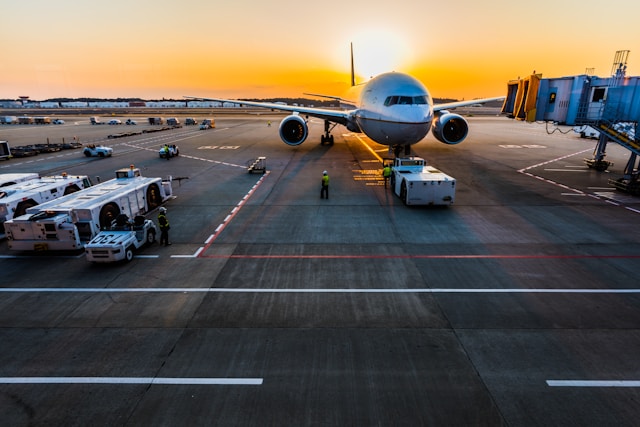Government approves passenger cap rise but rejects extended Saturday flight hours amid climate and local concerns
London City Airport is set to significantly increase its annual passenger cap from 6.5 million to 9 million, following a recent government decision. The move, which aims to accommodate rising demand, comes with a caveat: a proposal to extend the airport’s Saturday flight curfew from 12:30 PM to 6:30 PM was rejected.
The approval for the increased cap means that the airport will expand its morning flight schedule from 06:00 to 09:00. However, this increase will be conditional on the use of quieter, next-generation aircraft during these hours. Alison FitzGerald, the airport’s chief executive, expressed her satisfaction with the passenger cap rise but voiced disappointment over the curfew extension rejection.
Embed from Getty ImagesGreenpeace has criticized the decision, arguing that it undermines the UK’s climate leadership and benefits a wealthy few frequent fliers. The environmental group, alongside local residents and climate campaigners, contends that the increase in flights will exacerbate noise pollution and negatively impact local communities.
Newham Council, which had initially opposed the airport’s expansion plans, welcomed the government’s decision to maintain the Saturday cut-off. The council’s strategic development committee had unanimously rejected the proposals in July 2023, primarily due to concerns about increased noise pollution and the potential impact on the “weekend respite” rule that has been in place for 25 years.
Rokhsana Fiaz, the Mayor of Newham, expressed her ongoing concern about the noise impact from the increased flights. She stated, “I remain deeply concerned that our residents will be seriously harmed by the impact of further air-flight noise with today’s decision to allow an increase in flights in the early mornings throughout the rest of the week.”
FitzGerald highlighted that the rejection of the Saturday extension would delay the introduction of cleaner aircraft throughout the week, potentially limiting the environmental benefits that such aircraft would bring.
The decision to increase the passenger cap and reject the curfew extension was made by Angela Rayner, the Secretary of State for Housing, Communities and Local Government, and Louise Haigh, the Secretary of State for Transport. In their announcement, the Secretaries of State argued that extending the Saturday curfew would not significantly reduce overall noise levels.
Paul Morozzo from Greenpeace UK described the decision as a “clumsy misstep,” pointing out that many of the destinations served by London City Airport are reachable by train within six hours, including Amsterdam and Edinburgh. The proposals faced opposition from eight other London councils and local campaign groups as well.
The Department for Transport has yet to provide a detailed response to the concerns raised by climate and local advocates. The decision marks a significant moment for London City Airport as it navigates the balance between meeting growing passenger demand and addressing environmental and community concerns.
Analysis:
Political Perspective: The decision to increase London City Airport’s passenger cap reflects the government’s priority to support infrastructure growth and meet rising travel demand. However, the rejection of the Saturday curfew extension highlights ongoing tensions between development and regulatory measures. This decision indicates a governmental focus on economic benefits, potentially at the expense of local and environmental considerations. The conflict between expanding airport capacity and maintaining strict operational limits underscores broader political debates about balancing growth with sustainable development.
Social Perspective: The increase in passenger capacity at London City Airport touches on issues of local impact and quality of life. Residents and local councils have expressed concerns about noise pollution and the disruption of long-standing respite rules. The rejection of the Saturday curfew extension emphasizes the social divide between the needs of frequent travellers and local communities affected by airport operations. This decision reflects broader social tensions between development and community well-being, highlighting the challenges of accommodating growth while preserving local tranquillity.
Racial Perspective: The impact of airport expansion and increased flight operations can disproportionately affect marginalized communities, often those with fewer resources to mitigate noise pollution and environmental degradation. While the decision does not directly address racial concerns, the broader implications of increased pollution and noise can have indirect effects on communities of colour, which are frequently located near industrial or transport hubs. The debate around airport expansion thus intersects with issues of environmental justice and equity.
Gender Perspective: The decision to increase the airport’s passenger cap and the controversy surrounding the curfew may also intersect with gender considerations. Women, particularly those in lower-income or marginalized communities, are often more affected by environmental and noise pollution. Additionally, the push for cleaner, quieter aircraft could be seen as part of a broader agenda to improve the quality of life for all passengers and residents, indirectly supporting gender equity by reducing health disparities associated with noise and pollution.
Economic Perspective: The planned increase in passenger capacity is expected to boost the airport’s economic contributions, including job creation and increased tourism. The expansion aligns with broader economic goals of supporting growth and infrastructure development. However, the environmental and social costs associated with increased flights, such as noise pollution and potential health impacts, may offset some of these economic benefits. Balancing economic growth with sustainable practices remains a critical challenge, as highlighted by the debate over the Saturday curfew extension and the impact on local communities.
